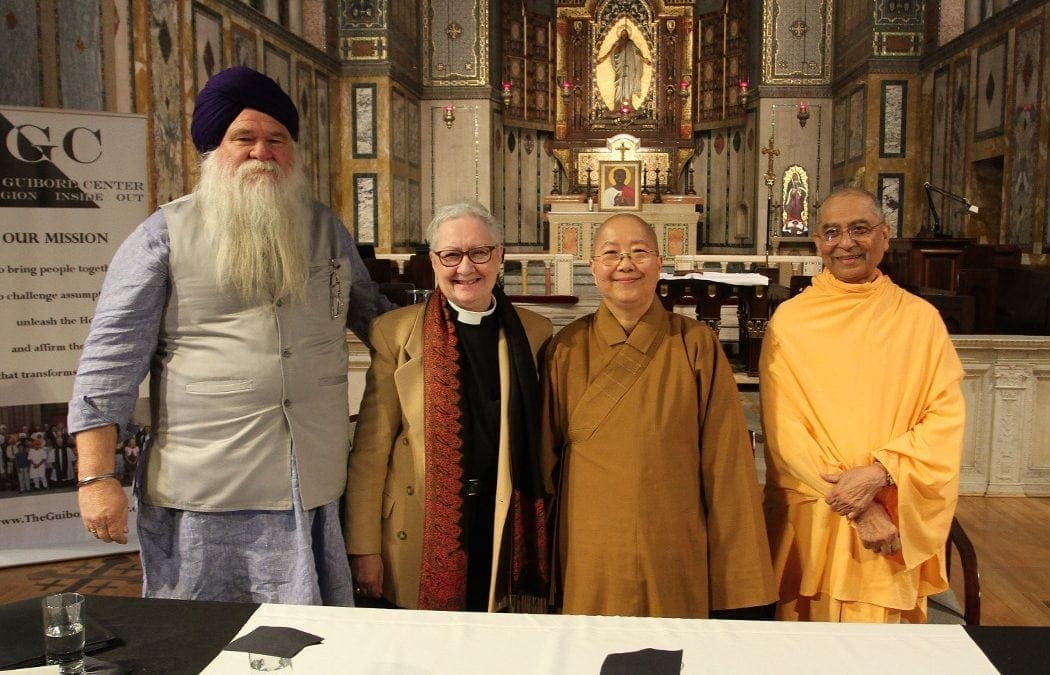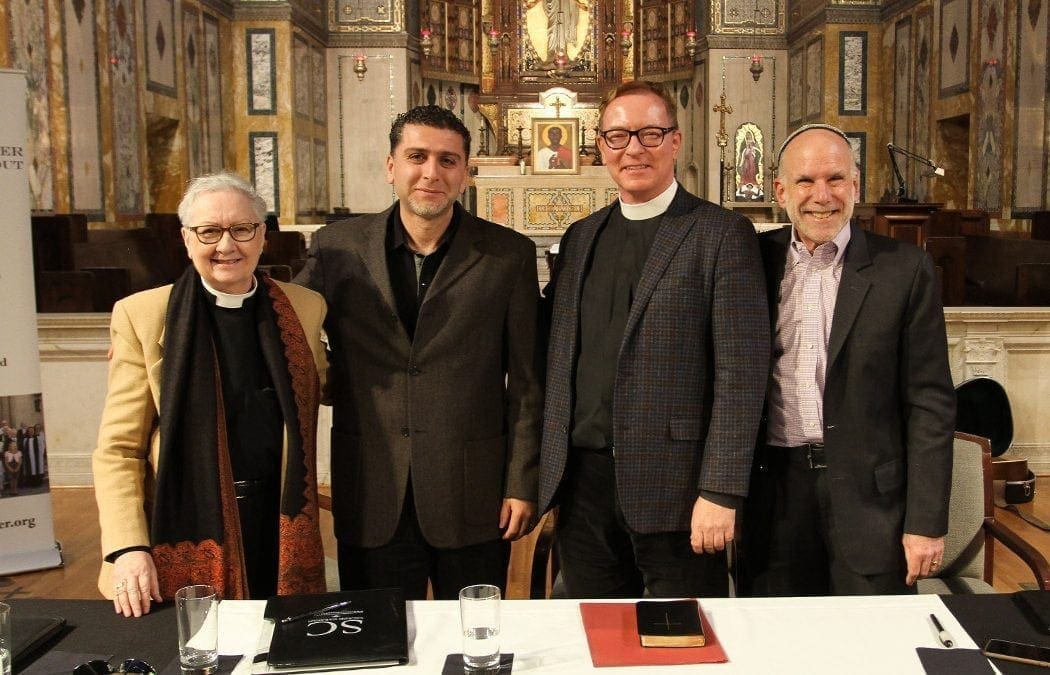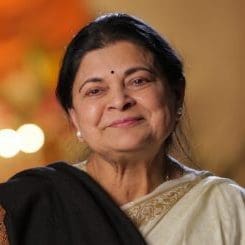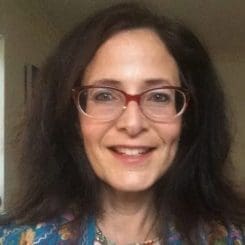No Results Found
The page you requested could not be found. Try refining your search, or use the navigation above to locate the post.

The Guibord Center’s Interfaith panel discussion on life after death took place in two sessions: morning and afternoon. The afternoon session offered the perspectives of the Hindu, Buddhist and Sikh traditions.
Venerable Miao Hsi from Hsi Lai Temple explained that we should not speak about death with elderly people or during celebrations. Dying is not quick; it is a process during which we are aware of what is happening but unable to communicate. Death is not something we should fear, nor is it the “grand finale.” Life is Karma we share with others here on earth.
Swami Sarvadevananda spoke of sleep as being a “little death.” The mind, which exists in the dream world, continues into the next life after we leave this body. We are not limited by the body we inhabit, but instead by our Karma and how we live our lives. We can view death as an experience that takes us to another life.
Nirinjan Singh Khalsa spoke about how Sikhs view death and dying. Sikhs are taught not to fear death so that they can live life fearlessly. The goal is to serve God and people and to learn from every experience. By doing so, you’ll reach the point where you no longer are reincarnated but can become one with God.

The Guibord Center’s Interfaith panel discussion on life after death took place in two sessions: morning and afternoon. The morning session focused on the perspectives of the Abrahamic faith traditions: Judaism, Christianity and Islam.
Rabbi Neil Comess-Daniels from Temple Beth Shir Shalom speaks of heaven and hell as reflections of the life we led on Earth. If someone always puts himself or herself first, then the afterlife will be spent with other self-centered people. If people put others’ needs first and help them throughout their lives, they’ll spend the afterlife with others who treat them the same way. Rabbi Neil shares a beautiful song he wrote for young people about losing a loved one to death.
The Rev. Canon Mark Kowalewski, Dean of St. John’s Cathedral, says Christians believe that in the midst of life, we are in death. Even though we’re always aware of our own mortality, we try to experience life to the fullest every day.
According to Imam Dr. Ahmed Soboh, Islam is a continuation of the Jewish and Christian religions. All Muslims believe in the hereafter, and death is not the end of the story. Islam teaches that the time and the place of our death are determined when we’re born. We can’t alter that appointed time. So, we must live our lives with awareness of what we say, because when we account for ourselves before God, our last words will make a difference. We want that final word to be good.

There is something about Mary, mother of Jesus, that we experience but cannot explain. It appears in the countless stories of her reaching across different faiths and boundaries to touch those seeking solace and compassion in a world heavy with grief.
We discover Mary through the stories our speakers share in their particular sacred scriptures. Mary, mother of Jesus, as seen in the Gospels of Christianity. Maryam, “the greatest of all women for all time,” as she is known in the Holy Qur’an. Mary Mata, Mother Mary, the beloved mother known to Hindus worldwide.
Three skilled panelists lead us on an engaging spiritual journey through the history of her presence in their faith traditions. We follow them through the past to the undeniable power of her presence today. Even in our contemporary world, Mary continues to bring solace and transformation to believers and unbelievers alike.
What does it mean to be virginal, pure, immaculate and obedient to God? The discussion following the initial presentations brought out a dimension of courageous strength and powerful knowing that challenges perceptions of Mary as passive and blindly pliable.
For Christians and Hindus, Mary is the mother who stands at the foot of the Cross, present for her son’s execution. In Islam, Mary is one who never shies away from the hardships or confrontation inherent in mothering her son.
Mary is seen throughout the world as one who rescues us from all manner of despair and consistently pushes us towards peace in the midst of war. She illustrates that deep faith and remarkable courage are essential for compassion. In a world in urgent need of such transformative spiritual strength, we have much to learn from the Mary of Christianity, of Islam and of Hinduism.
The page you requested could not be found. Try refining your search, or use the navigation above to locate the post.
From Dr. Ray Mattes
Truly Our Sister: A Theology of Mary in the Communion of Saints by Elizabeth A. Johnson, Continuum 2003.
Blessed One: Protestant Perspectives on Mary edited by Beverly Roberts Gaventa and Cynthia L. Rigby, Westminster John Knox Press, 2002.
Mary in Early Christian Faith and Devotion by Stephen J. Shoemaker, Yale University Press, 2016.
The Origins of the Cult of the Virgin by Chris Maunder, Continuum Books, 2008
Poem read by Dr. Lo Sprague
“Gabriel’s Annunciation” © Jan Richardson from The Advent Door.
https://adventdoor.com/2014/12/19/advent-4-gabriel-and-mary/
Download and print the poem: Gabriel’s Annunciation


Dr. Rini Ghosh, Secretary of The Guibord Center Board of Directors, has been a key part of the Center since it began. A previous member of the Advisory Council, she is also active in the Center’s programs for children, youth and young adults.
Rini was born and educated in India, where her PhD dissertation focused on “T.B. Macaulay’s Minute: Formalization of English Education in India.” She has lived in California for over 35 years, running her own business.
From a young age, Rini has been a peace activist and steadfast follower of Swami Vivekananda and Mahatma Gandhi. A passionate advocate of interfaith cooperation, she has promoted peace, nonviolence and interfaith activities around the world. Rini serves on the board of the Vedanta Society of Southern California; as President of Vedanta International Cultural Center (VICC); and as Director and Parliamentarian of the United Nations Association, Pacific-Los Angeles Chapter.
A Universal Peace Federation Ambassador for Peace, Rini has been honored with the South Coast Interfaith Council’s Interfaith Unity Award. The Urban Community Outreach Center, Long Beach has recognized her and VICC for inspirational service/seva to the homeless.
Speaker: There’s Something About Mary: Why Major Religions Revere the Mother of Jesus


Dr. Sophia Pandya is a professor and chair of the Department of Religious Studies at California State University, Long Beach. Winner of CSULB’s 2016 Advancement of Women Award from the President’s Commission on the Status of Women, she received her BA from UC Berkeley in Near Eastern Studies/Arabic, and her MA and PhD from UC Santa Barbara in Religious Studies. A Fulbright Scholar, she specializes in women and Islam, and more broadly in contemporary movements within Islam.
Dr. Pandya has authored a book, Muslim Women and Islamic Resurgence: Religion, Education, and Identity Politics in Bahrain (2012), on Bahraini women and the ways in which globalization and modern education impacted their religious activities. Having carried out research in Turkey on several occasions, she is also the co-editor of a second published volume (2012), The Gülen Hizmet Movement and its Transnational Activities: Case Studies on Charitable Activism. She is currently working on a book on the stories of Turkish refugees, and the meanings they find or construct from their ordeal.
Speaker: There’s Something About Mary: Why Major Religions Revere the Mother of Jesus